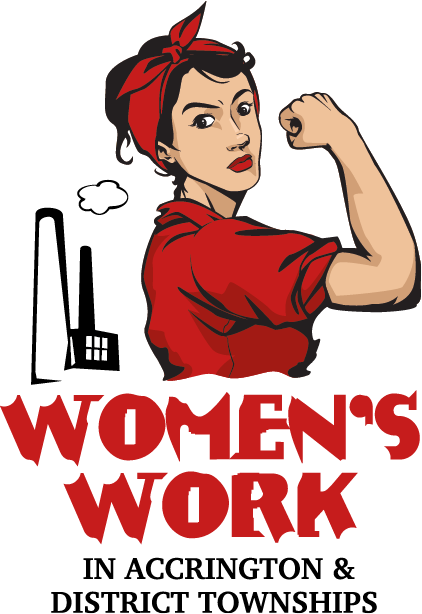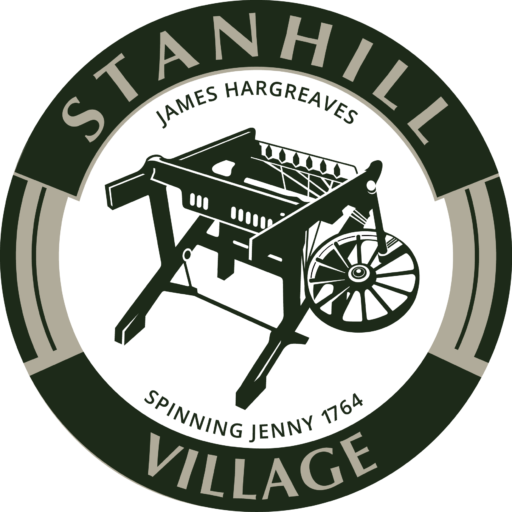I’m Doreen Pollard and I was born on the 4th of February 1938. I was born in a cottage. It was called Up The Cliffe in Great Harwood and it was my mother, my father, and my brother then.
My mum was a weaver, all her life, and my father went to war and when he came back from the war, he went working down in the pit, but he didn’t like it and then he ended up in the weaving mills. So, you know, he spent his working life most of it in the mills.
I was 15 when I left school, but I had no choice whatsoever. I had to go in the weaving mill. We had to do what my mother said in those days. Yeah. I wanted to be a hairdresser. No, there’s no money in hairdressing. So you’re going in the mill and I’ll get you some looms at the end of it because we had to go to school first to learn to weave, you know, so that’s what I did when I left school. No interviews whatsoever. Just turned up.
We were paid £2 per week and 40 hours. That was my first week’s wages. I didn’t get it, I had to give it me mum. She gave me ten shillings back out of that which was 50 pence today. I had to save up for a week’s holiday with the girls out of 50 pence a week.
You’d to go all year. Yeah, and then with that 50 pence, we used to go to the pictures once a week, and used to go dancing twice, oh and a week’s holiday. It was only seven pounds in the Isle of Man then for a week’s holiday in a nice hotel. Yeah.
(Margaret enjoyed dancing and we talked about the places she used to go.)
It was called the Jazz in Great Harwood and it was above a bakehouse and we used to go dancing there regular and I was on the staff actually, you know, when I’d learned to dance, he asked me if I would teach you the others like, you know, when I was about 17 that was. And then we used to go to Blackburn and Accrington to different dance halls, and then on a Saturday night we used to go to Blackpool on the train and it was called the passion wagon.
Yeah, we went to Blackpool and in the Winter Gardens, or the Tower. Ballroom. Yeah, used to dance there on a Saturday night. This was all until I was 20 from leaving school. Two, three, four times a week (we went dancing). Yeah, when I got on the staff, you see I didn’t have to pay to go in so that was okay. So four nights a week, dancing, and 40 hours a week at work.
Some men were nice, and others weren’t, quite, what I call a bully, you know. I think it was because we were young girls and you know, we didn’t know much about life, sort of thing then, and they could be quite nasty with us. Used to go home many a time, crying many times, you know, saying, Bert made me cry today Mum.
Because we were very naive, you know, in those days. We weren’t like 15 year olds are today. No, there were some nice ones (tacklers). There were some nasty ones as well. But I found out the nasty ones, later on in life. I met their family, and they couldn’t believe, when I told them how nasty, they were. They said well, honestly at home, it was the wives who were the boss. They were frightened of the wives, you know, and they would take it out on us.
They would show you up and embarrass you, when you went into this room where they were all sat, smoking and drinking cups of tea, you know until somebody needed them to go and repair a loom, you know, and I don’t know if I can say this or not…one man in particular, you know, I can’t name names. He, you know you’d go in and he’d say ooh your titties are growing, you know, things like that, you know. 15. No, it’s not right nice, when you think about it, but that was what one in particular was like. And sometimes they’d come to your looms and feel at your bottom and stuff like that, you know, no different than they are today I suppose with that.
You know, you don’t (complain). Never even told me mother. No, just the girls, you know, and the same was happening to them, you know. No. No, we daren’t (complain).
Well, I think we were frightened of our mums finding out, that they were talking to us like that because my mum would have done something about it, you know, I mean they would do today and honestly, we were frightened of everybody, we were, because we had to do as we were told.
Yes, well when I came out of the weaving school because you had to work there six weeks to learn to weave and then we went and got looms in the mill. Well, this Auntie Maggie was an old maid and really, really old fashioned.
And the first day she said, right? Come on. She said, get your dinner down you, we’re going up Great Harwood. Well I didn’t ask why or anything. And when we got up there, she went knocking on the undertaker’s door and it was called Ted Birtwhistle. Still a Birtwhistle in Great Harwood. I mean how long ago is this, nearly 70 years ago.
And so anyway, this man opened the door and he said, right Maggie? Who have you come to look at today? Oh, she says, I’ll just see who’s in. I hadn’t a clue. I didn’t know where we were going. I didn’t even know it was an undertaker. So she took me in and all these coffins round the room.
And then I said, where are we Auntie Maggie? She said just follow me and she’d look in one coffin and it might be a lady that were dead, you know, and she said, oh, she were a lovely woman and then she’d go on to another. I mean, it wasn’t the same every day, but I can remember these incidents. There’d be a man and she’d say, oh he were a bad bugger with his wife.
And these are all dead people, you know! and I did this for six months! So then I went home one day and I said to my mum I said, Do I have to go to the undertakers with Aunty Maggie? and she said, I didn’t know you were going. She said no, you don’t, I’ll tell Auntie Maggie not to take you anymore. So I never went any more.
Yeah, we did a full dinner hour and all the looms got switched off, you know, everything went quiet. Then you knew you could go out, you know. My mum used to give me a proper dinner in a dish and there used to be a room with ovens in, where we could warm our dinner up, you know, but I cannot remember. There were two Asian boys started work in the mill then and you know, they used to share a tin of Kitty Cat cat meat. Yeah. That’s what they had for dinner. Every dinner time they shared a tin of Kitty Cat. That’s unusual wasn’t it.
At the end of the day it was a hooter, really loud, because the looms made a lot of noise, you know. But you do you know, you were always looking at the clock to see what time it was, you know, and you wait while the looms stop and then it was coat and off.
Village Wedding Parades – I can’t find out why, it wasn’t just the mills but I’ve spoken to one person and she used to work at the slipper works in Great Harwood and they did it there and it was just the girls that did it.
It was a girl, they used to dress up and they called it the village wedding. So we had to get, I don’t remember where we got the clothes from. I mean, they’d be second hand because all the clothes were second hand, you know, we never got new clothes. It was two bridesmaids, the bride and groom. And I was the vicar, you know, supposed to be marrying them, you know, you pretended, they were getting married.
Now the bride, she had a bride’s dress on and a cauliflower for a bouquet, and the bridegroom, I was only talking to her the other day, but she didn’t know me, she’s got Alzheimer’s. She had a black hat on, black suit, one of those big pipes in her mouth and a big alarm clock in her hand. And that was the groom! There were five of us. Yeah, two bridesmaids. Yeah, but I only did that once you know, and whether they carried on doing it, I don’t know. We walked round the factory when the looms were stopped at lunchtime. We just paraded around the factory and everybody clapping.
That was February 1960 (when she went to London with her husband). We stayed for 12 months in London and I was homesick. So we came back and I got pregnant pretty soon. So I didn’t work, you know, and I went living with his mum, for about six months until we’d saved up for a deposit on a house.
No, he never wanted me to work. But I mean I knew I’d have to do at some point, you know, I mean, I like going to work but not in the mill. I mean, when I was down in London, I went to working in a supermarket and I loved it. I did. It was lovely. Yeah.
My first one I went to, I didn’t go for an interview. No, I was walking down the main street. We lived in a place called Streatham in London and next door to a man. Have you ever heard of Mel Torme, the singer? Well, we lived next door to him. Yeah, and he used to sing “In a Mountain Greenery, where God Paints the Scenery” and he used to sing this in his back garden.
Yeah, 12 months. And it was only a bedsit. You know, it was everything in the kitchen, the living room, the bed, was it all in one room, you know, and it was only 5 pounds a month, a bedsit in London. 1960 this was.
My husband worked nights on the railway, so I didn’t know anybody, you know, so I thought I’m going to look for a job. So I walked down Streatham High Street one day and I saw this supermarket advertising jobs. It’s called Pridors and I opened the door. There was a big staircase and there was a girl coming down. I said, excuse me. I said, do you know where the manager is? And the next thing, I heard this voice from the top of the stairs shout “Come up here love!” I looked up and I goes up. He said, “You’re from Lancashire, aren’t you?” and I said “Aye, I’m from Burnley.” “Well,” he says, “Have you come for a job?” And I said, yeah, he says, “When can you start?” I said “Tomorrow?” And he said, “Right, start tomorrow,” he said, “I like you Lancashire lasses.” So I got a job at the supermarket!
And then a few months later, I was pregnant, and the girls were brilliant. I had a craving for strawberries, every time they went on their break, they were coming filling their pockets with strawberries and giving me these strawberries, but I had a right good time there, you know, but anyway, we decided to come home.
We lived with his mum for a about six months and then we saved up and got this house.
And then so on like I didn’t really work. We had a little girl in the December 1960.
When she went to school, that was the only time, you know, he agreed for me to go to work. So she went to school at three year old but I was thinking how I can get a job now? Then I was pregnant again. So I had another little girl three years later so I couldn’t go to work again. So then in between, so when they were both of school, I got a job on what they called the home help.
So I could take them to school in the morning and finish at one o’clock at, at dinner time. So I was home to go back to school, to pick them up and bring them home, you know, so I only worked part-time, then now it was like 1962-63 and then I carried on with that for about what six seven years and then I had two boys in 12 months. So I was off work again.
He didn’t want me to work full stop. “I’ll provide for you.” But I knew we didn’t have enough money, you know, so that’s why, I didn’t start work really until the boys had gone to school.
1970 was when my second boy was born. Yeah, my first one was 69 and then the 2nd in 1970. I were that busy, him working and me looking after children…I didn’t get involved in anything like that (equal rights). I think it was because I was involved with the children so much. Because he was working so much. He wasn’t involved with the children much.
I used to live on Drill Hall Lane at Church. It’s a long way, with the children, I used to go and take the children to my mother’s once a week and I wouldn’t do it today. I used to push that pram with the two girls down the side, the two boys in the pram. See, he was working all the time. And I used to push it up this big hill, down to Clayton le Moors, down to Hyndburn Bridge, up into Great Harwood, and me mum lived right at the top of a big hill and I bet it’s three miles and it’s all downhill, uphill you know. I did that every Sunday. Yeah, for years and years, pushing that pram.
My husband was a joiner. He used to work, when he’d got to work you know. I mean, he used to work for his uncle, at the beginning when we came back from London. He went to the post office but he wasn’t very keen on being a postman. So he went with his uncle joinering and then later he was self-employed like, you know. He wasn’t involved with the children at all. It was hard work.
It’s great-grandchildren now with me. My own children that have children. I mean, I’ve never had to look after them because I was working. Then when me own children had children, you know, I don’t want to start looking after great-grandchildren now.
They don’t know they’re born. No, they have a cushy life now. Yeah, I mean, there’s a lot don’t work isn’t there.
Oh, yeah (I’d definitely do things differently). I’d go further on though. I’d divorce my first husband for not being there for the children. I wouldn’t have had as many children. But it’s just what it has to be isn’t it.
No, I wouldn’t go back to it, it was hard work. I think they have it easier now, they don’t think so, but they don’t know what it was like for us when we were younger. You know, it was, it was hard work. But I think it would have been easier for me if I had got a man that was family-orientated instead of working, you know. Which I did. Second time!
I just wish I could have my life over again and do it differently. That’s never going to happen. Is it? I had, what 23 years with my second husband before he died that made up for a lot of stuff, ‘cause he was family-oriented, you know, I made sure of that second time, you know. When we got together, he had lost his wife when she was in her forties with cancer and we worked together in the Christmas card factory at Church. And we got together after, and he had three boys.
I’d four and we’d seven children! and we got together and honestly, it was great. Great. Yeah. I mean, I found it really hard work with my four but with having him as a family man, we’d 7, you know, with teenagers and young ones, you know, and it worked marvellous because we were both were compatible, you know, yeah.
I mean now, these three stepsons. One of them has an hotel in Keswick. Honestly, they’re absolutely brilliant with me. I couldn’t wish for better stepsons. I couldn’t, honestly. I’ve one in Devon, I’ve one in Australia. I can go any time for holidays, you know.
My eldest daughter is retired. The other one lives in a lodge over at Cockerham, they’ve no children, but they’re all happy, you know, because I have told them all about my life. I don’t want them to go through what I did.




